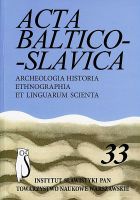Archaizmy leksykalne w „Kurierze Wileńskim” (1924–1939)
Lexical archaisms in „Kurier Wileński” (1924–1939)
Author(s): Joanna Joachimiak-Prażanowska Subject(s): Language and Literature Studies
Published by: Instytut Slawistyki Polskiej Akademii Nauk
Keywords: Vilnius Region; the language of the press; borderland variety of the Polish language; twenty-year interwar period; archaisms.
Summary/Abstract: This paper presents archaic lexics being in use in the interwar Polish language at the territory of the North‑Eastern borderlands. The analysis has covered peculiar vocabulary noted down from the „Kurier Wileński”, a daily newspaper published in Vilnius during the twenty‑year interwar period. The gathered linguistic phenomena have been confronted with the resources of the Polish and Russian definition dictionaries and translation dictionaries. Also the etymological dictionaries and linguistic guides served as a comparative source. The author has excerpted 96 archaisms, it means the words belonging to the oldest all‑Poland vocabulary. In the period under investigation they were not used any longer in the ethnic Polish language. Among this lexics a significant percentage covers the borrowings from foreign languages. They are Latinisms (azylum, cyrkuł, cyrulik, invidia, investygacyjny, kloaka, kwarta, teatrum, wjatyk) and Germanisms (jegier, junkier, komponista, oberpolicmajster), which as soon as after the post‑partition period were being eliminated from use. A part of the vocabulary referred to was based on the East Slavic languages (Russian, Belarusian and Ukrainian). That fact impeded the process to withdraw the words from circulation over the borderlands. This phenomenon was reflected by the language of the editors of the „Kurier Wileński” between 1924 and 1939.
Journal: Acta Baltico Slavica
- Issue Year: 2009
- Issue No: 33
- Page Range: 109-129
- Page Count: 21
- Language: Polish

